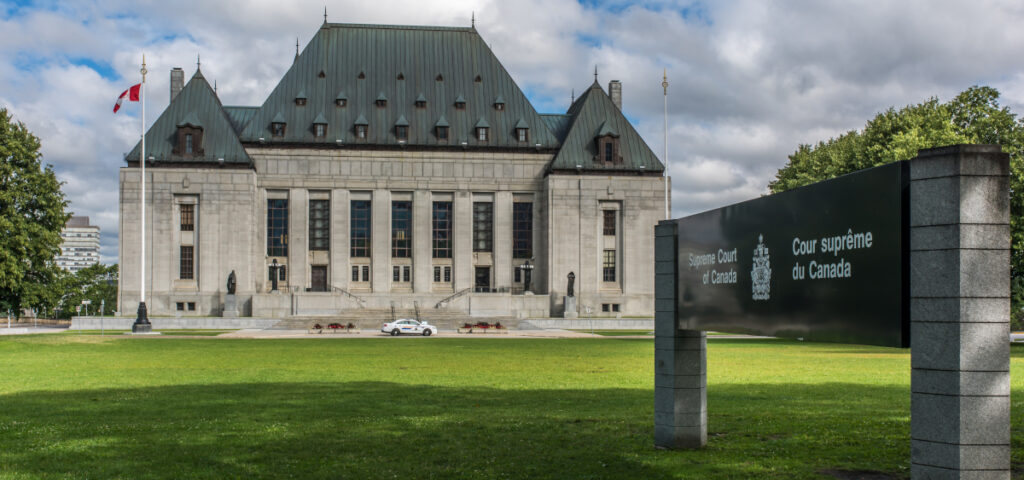Behind every historic judgement, there’s a human drama with people fighting to assert their rights. In 1989, Jean-Guy Tremblay argued that a fetus had a right to life. Opposing him was Chantale Daigle, defending her right to have an abortion. The Supreme Court of Canada agreed to hear this important case on an urgent basis. It stands as a historic precedent regarding abortion rights in Canada.

A relationship turned violent
Jean-Guy Tremblay and Chantale Daigle began their relationship in November 1988. Things seemed to go very well for a while. So well that he asked her to marry him and convinced her to stop using birth control. Chantal learned she was pregnant in March 1989.
But things deteriorated after that. Jean-Guy became controlling and violent. Chantale decided to leave him and have an abortion. They broke up in early July 1989. Chantale made arrangements to have the abortion. She was then 18 weeks pregnant. The more time passes, the more difficult – and even risky – an abortion becomes.
|
Editor’s note: Although in court proceedings, Chantale’s first name is spelled without an “e”, Ms. Daigle has always written her first name with an “e”. |
The only woman in Quebec barred from having an abortion
Jean-Guy went to court to try to stop Chantale from having the abortion. He argued that a fetus is a human being with a right to life. As the future father, he wanted to be able to stop the abortion. Based on this argument, a judge granted a provisional injunction on July 7, forbidding Chantale from having the abortion.
An injunction is a court order obliging someone to do or not do something.
Obtaining a final injunction may take some time. While awaiting a final decision, a judge can order an interlocutory injunction. This type of injunction lasts until the final decision on the case.
If the situation is urgent, a provisional injunction may be requested. It is valid for just ten days.
Ten days after the provisional injunction was issued, the ex-couple found themselves in court. The judge again accepted Jean-Guy’s argument and issued an interlocutory judgement which stated that, if Chantale obtained an abortion, she could face a fine of $50,000 and two years in prison. She became, in effect, the only woman in Quebec who was barred from having an abortion.
Chantal appealed this judgement to the Quebec Court of Appeal, which issued its own decision on July 26. The Court upheld the injunction. Chantale then appealed to the Supreme Court of Canada.
On August 8, the Supreme Court heard the case. However, during the hearing, Chantal’s lawyer informed the court that Chantale had obtained an abortion. The Court decided to hear the case anyway because other women could find themselves in the same situation as Chantale and because Chantal herself could face a hefty fine and prison time if the injunction remained in effect. The final result: the Supreme Court decided unanimously in favour of Chantal and cancelled the injunction.
A fetus does not have a legal status
The Supreme Court ruled that Jean-Guy could not invoke the right to life to stop Chantale from having an abortion. The Court stated that, in legal terms, a fetus is not a person or a human being and therefore does not benefit from the rights guaranteed by the Quebec Charter of Human Rights and Freedoms, including the right to life.
Neither the Charter nor the Civil Code of Quebec legally recognizes a fetus as a person. The terms “person” or “human being” cannot apply to a fetus, which only acquires this status at birth.
The Supreme Court ended by stating that a future father has no right to veto a woman’s decision regarding a fetus she is carrying.
The Court therefore cancelled the injunction. Legally, this has the same effect as if it never existed. Therefore, Chantale could face no punishment for failing to respect the terms of the injunction.
Since this case was decided, abortion rights have continued to evolve. In Quebec, abortion is now legal throughout pregnancy. The decision to abort or to give birth always belongs exclusively to the person who is pregnant.
|
Cases in Brief Are you interested in court decisions that make history? The Supreme Court provides a summary of each judgement it issues in easy-to-understand language. You can find this on the Supreme Court’s website at Cases in Brief. |





